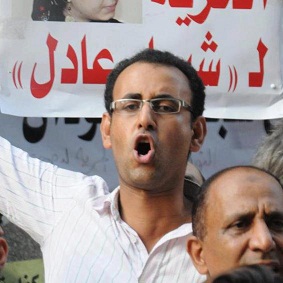CAIRO: Breakdown of referendum results showed sweeping support for the constitutional amendments in Delta governorates while the call was close in urban cities.
Out of about 45 million Egyptians eligible to vote, 18,366,764, or 41.19 percent, hit the poll stations on Saturday.
According to the Supreme Judicial Committee supervising the referendum, 14,192,577 voted yes (77.2 percent), while 4,174,187 voted no (22.8); 170,190 ballots were invalidated.
Cairo had the highest turnout with 2,306,561 voters, 59.9 percent of whom said yes, the lowest among governorates.
Alexandria came second with 1.5 million voters, 66.6 percent of whom said yes.
Urban areas around Cairo had more support for the amendments with 67.2 percent of Giza’s voters saying yes, 71.4 percent of Helwan’s and 83.5 percent of Sixth October City.
Delta governorates of Sharqya, Beheira, Daqahlya had the most sweeping support for the constitutional amendments scoring 85.9, 86.9 and 79.1 percent, respectively.
Minya had the highest turnout among Upper Egypt governorates with 1,121,260 voters, 75.6 percent of whom said yes.
Southern Sinai governorate had the lowest turnout with 39,128 voters, 66.1 percent of whom supported the amendments.
Assiut governorate which has a large Coptic population, reportedly against the amendments, had 72.5 percent of its voters choosing yes.
No governorate had a majority refusing the constitutional amendments.
"Not all people affiliated with the Islamic stream voted for the amendments and neither did all Copts vote against it,” said Nihal Fahmy, political expert at the United Nations in Egypt. “But the outcomes may have been affected by the intensity of campaign supporting or refusing the amendments."
"Many people said yes believing that this will restore stability to the country, especially day-to-day labor and the elite wanting a quick transformation to civilian rule," she added.
Hassan Nafa’a, political science professor at Cairo University, agreed with Fahmy that categories mostly affected by economic setbacks voted yes for a quick path to economic stability.
"Many people who voted yes see that this option is less radical and more stable especially for the economy," he added.
Fahmy said that a sweeping 77 percent supporting the amendments doesn’t mean that the Islamic stream, publicly supporting the amendments, is that strong.
"Political parties now have hard work ahead to interact with the street now that they are pressured in time. They need to form coalitions to face a strong Islamic stream," Fahmy said.
Parliamentary elections are expected to be held in September. Analysts and politicians have expressed fears that only the Muslim Brotherhood and the once-ruling National Democratic Party have the organization needed to win the majority of seats.
"[Political parties] called for voting no to give themselves sometime to prepare, although the Supreme Council of the Armed Forces didn’t specify a timetable for the upcoming steps in case of a no. They might have found themselves involved in a legislative election sooner than they thought," she added.
Nafa’a said that Islamists, as ideologically different as they were, managed to create a strong yes vote.
"This is an indication that they will mobilize as much as they can for a different society."
Fahmy said that Jan. 25 youth must now form their own parties and use the same technological techniques to mobilize masses in their favor. The youth would have a good chance if the media supported them, he added.
Like Fahmy, Nafa’a didn’t believe that a sweeping yes vote represented Islamists. But he had a different theory.
"Whoever thinks that 77 percent of the yes vote is completely due to Islamists’ influence is mistaken," he said. "There are the remains of the NDP, and they are still strong especially in rural areas."
Even if Muslim Brotherhood broke the national consensus over the no vote, they have to come back again to the other political streams, he added.
"The Muslim Brotherhood always breaks the national unity because of the group’s own benefits, but it always comes back again to form allies and coalitions with the other political streams, because both cannot be politically effective without the support of each other."
Political powers and the Jan. 25 coalition should come together to form a unified list of parliamentary candidates regardless of different in ideology, according to Diaa Rashwan, deputy head of the Ahram Center for Political and Strategic Studies. This would be the best way to combat what’s left of the National Democratic Party, he added.
"Whoever thinks that the NDP is dead is completely mistaken; this party is still alive and political streams have to organize themselves against it."
Historically, it was always difficult to get all political streams under one coalition; "but let’s hope that the new circumstances will encourage such a coalition to be formed."
The Supreme Council of Armed Forces is expected to issue a constitutional declaration including the amendments to organize the proceedings of the transitional period.

